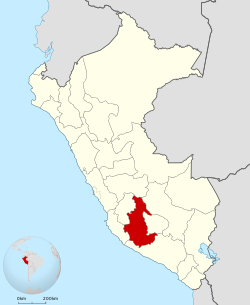Department of Ayacucho
Ayacucho
| |
|---|---|
 Sara Sara and Lake Parinacochas in front of it | |
 Location of the Department of Ayacucho in Peru | |
| Country | Peru |
| Subdivisions | 11 provinces and 111 districts |
| Largest city | Ayacucho |
| Capital | Ayacucho |
| Government | |
| • Governor | Wilfredo Oscorima Núñez (2023–2026) |
| Area | |
| • Total | 43,814.8 km2 (16,917.0 sq mi) |
| Elevation (Capital) | 2,746 m (9,009 ft) |
| Highest elevation | 5,505 m (18,061 ft) |
| Lowest elevation | 1,800 m (5,900 ft) |
| Population (2017) | |
| • Total | 616,176 |
| • Density | 14/km2 (36/sq mi) |
| UBIGEO | 05 |
| Dialing code | 066 |
| ISO 3166 code | PE-AYA |
| Principal resources | Potatoes, wheat, olluco, barley, sheep and handicrafts. |
| Poverty rate | 72.5% |
| Percentage of Peru's GDP | 0.65% |
| Website | www.regionayacucho.gob.pe |
Ayacucho (Spanish pronunciation: [aʝaˈkutʃo] ), known as Huamanga from its creation in 1822 until 1825,[1][2] is a department and region of Peru, located in the south-central Andes of the country. Its capital is the city of Ayacucho. The region was one of the hardest hit in the 1980s during the guerrilla war waged by Shining Path known as the internal conflict in Peru.
A referendum was held on 30 October 2005, in order to decide whether the department would merge with the departments of Ica and Huancavelica to form the new Ica-Ayacucho-Huancavelica Region, as part of the decentralization process in Peru. The proposal failed and no merger was carried out.[citation needed]
Political division
[edit]
The department is divided into 11 provinces (Spanish: provincias, singular: provincia), which are composed of 111 districts (distritos, singular: distrito).
Provinces
[edit]The provinces, with their capitals in parentheses, are:
- Cangallo (Cangallo)
- Huamanga (Ayacucho)
- Huanca Sancos (Huanca Sancos)
- Huanta (Huanta)
- La Mar (San Miguel)
- Lucanas (Puquio)
- Parinacochas (Coracora)
- Paucar del Sara Sara (Pausa)
- Sucre (Querobamba)
- Víctor Fajardo (Huancapi)
- Vilcas Huamán (Vilcas Huamán)
Demographics
[edit]Languages
[edit]According to the 2007 Peru Census, the language learnt first by most of the residents was Quechua (63.05%) followed by Spanish (36.57%). The Quechua variety spoken in Ayacucho is Chanka Quechua. The following table shows the results concerning the language learnt first in the department by province:[3]
| Province | Quechua | Aymara | Asháninka | Another native language | Spanish | Foreign language | Deaf or mute | Total |
|---|---|---|---|---|---|---|---|---|
| Cangallo | 29,356 | 24 | 4 | 11 | 3,132 | 3 | 37 | 32,567 |
| Huamanga | 104,644 | 223 | 42 | 118 | 102,452 | 72 | 218 | 207,769 |
| Huanca Sancos | 8,017 | 29 | 1 | - | 1,858 | - | 18 | 9,923 |
| Huanta | 58,333 | 89 | 92 | 40 | 28,184 | 5 | 105 | 86,848 |
| La Mar | 64,815 | 64 | 127 | 58 | 12,950 | 1 | 111 | 78,126 |
| Lucanas | 26,153 | 152 | 7 | 49 | 35,282 | 10 | 78 | 61,731 |
| Parinacochas | 15,491 | 68 | - | 30 | 12,576 | 2 | 29 | 28,196 |
| Paucar del Sara Sara | 5,223 | 19 | 1 | 15 | 5,140 | - | 16 | 10,414 |
| Sucre | 9,059 | 25 | - | - | 2,749 | - | 13 | 11,846 |
| Víctor Fajardo | 20,647 | 37 | 2 | 9 | 3,213 | - | 38 | 23,946 |
| Vilcas Huaman | 19,884 | 14 | 2 | 11 | 2,232 | 1 | 44 | 22,188 |
| Total | 361,622 | 744 | 278 | 341 | 209,768 | 94 | 707 | 573,554 |
| % | 63.05 | 0.13 | 0.05 | 0.06 | 36.57 | 0.02 | 0.12 | 100.00 |
Gallery
[edit]-
The Andes go across the Ayacucho Region
-
Statue of Antonio José de Sucre and obelisk near Kinwa, commemorating the Battle of Ayacucho.
-
Hot springs in the region of Ayacucho.
-
Obelisk near Kinwa, commemorating the Battle of Ayacucho.
-
Church of Ayacucho
References
[edit]- ^ "Caracterización del departamento de Ayacucho" (PDF). BCRP.
- ^ "Copia de Decreto que cambia nombre a Huamanga". Biblioteca Bicentenario. 1825-02-15.
- ^ inei.gob.pe Archived January 27, 2013, at the Wayback Machine INEI, Peru, Censos Nacionales 2007
External links
[edit]13°09′47″S 74°13′28″W / 13.16306°S 74.22444°W







